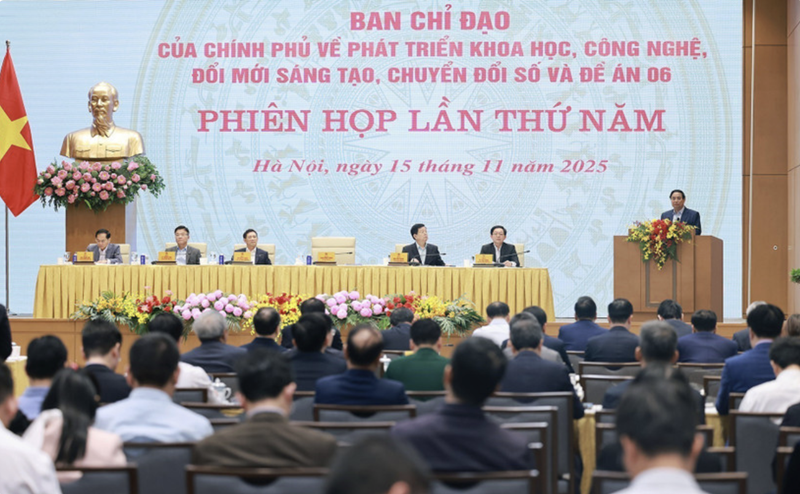Concluding the fifth meeting of the Government’s Steering Committee on Science, Technology, Innovation, Digital Transformation, and Project 06, he called for a proactive shift from passive administrative reception to a digitally-driven, enabling, and service-oriented administration that better serves both people and businesses.
    |
 |
|
The fifth meeting of the Government’s Steering Committee on Science, Technology, Innovation, Digital Transformation, and Project 06 held on November 15 |
Unified, consistent, comprehensive, effective governance
At the meeting, the Steering Committee reviewed progress in implementing national tasks on science and technology development, innovation and digital transformation; the execution of Project 06 on national population data; and the results of administrative reform to date, alongside priorities through 2025.
Delegates focused on identifying breakthrough solutions to accelerate progress, clear remaining bottlenecks, strengthen data connectivity, streamline administrative procedures, and overcome challenges in implementing the new two-tier local government model.
Over recent months, the Government’s direction has been described as “unified, coherent, consistent, comprehensive and effective,” with 12 directives, 22 official dispatches and 28 conclusions issued to implement Resolution 57 of the Politburo on breakthroughs in science-technology, innovation, and national digital transformation. Ministries and localities have completed 370 of 944 tasks, with 67% implemented on schedule.
Legal frameworks and policies on science and technology, innovation, digital transformation and Project 06 have been strengthened. Since early 2025, 19 draft laws and 10 resolutions related to these fields have been submitted to the National Assembly for approval.
Vietnam continues to advance on global innovation indicators, ranking 44th among 139 countries in 2025. Connectivity infrastructure has also improved significantly, with Vietnam listed among the world’s top 13 countries for internet speed, 5G coverage reaching 39.5% of the population, and the completion of a 3,900-km land-based fiber optic cable connecting Vietnam to Singapore. Major AI data center projects are underway, including plans for a national hyperscale data center in Ho Chi Minh City.
The digital industry remains a growth pillar, with revenue exceeding 4 quadrillion VND (nearly 152 billion USD) in the first 10 months of 2025, up 52.4% year-on-year. Digital product exports reached 142 billion USD, up 27%.
Digital government reforms under Project 06 continue to deliver tangible benefits to citizens and businesses. Two-tier local governments are functioning smoothly, and digital public services are shifting from passive provision to proactive data-driven service delivery.
Digital society development has also expanded rapidly. Over 132 million banking records and 1.4 million customer profiles have been authenticated via chip-based ID cards; 74% of provincial public hospitals now use electronic medical records; and 50 services are available on the VNeID platform, which receives 1.5 million daily visits. The “Digital Literacy for All” program has trained more than 203,000 learners, reducing training costs by 80%.
Administrative reform has seen strong results, with 741 procedures decentralized to local authorities, 1,007 procedures simplified, and over 2,200 business conditions removed. Nearly 3,100 administrative procedures and 2,269 business conditions are slated for further reduction or simplification.
Vietnam is also strengthening human capital for science and technology. Major universities have incorporated innovation and AI into training programs, and nearly 50 international cooperation agreements have been signed.
Acceleration required, with results as benchmark
While recognizing significant progress, the PM pointed out shortcomings including slow development of key national databases, uneven digital infrastructure, inadequate resource allocation, and shortages in high-quality human resources, especially in artificial intelligence, big data and cybersecurity. Data sharing and system connectivity remain fragmented in some areas.
He stressed that results must be the primary measure of effectiveness, and that officials unwilling to act must be replaced. All overdue tasks must be resolved by the end of 2025, especially national database projects. By 2025, 80% of administrative procedures must be handled entirely online.
The cabinet leader outlined six priority tasks including completing all ministry- and locality-level databases in 2025 under the principle “accurate – complete – clean – live – unified – shared”; improving institutions and policies to favor innovation and digital transformation; modernizing and unifying digital infrastructure, especially at grassroots level; allocating sufficient personnel for digital transformation, and promoting “Digital Literacy for All” nationwide; ensuring absolute data security and personal information protection; and deploying real-time monitoring tools and KPIs to evaluate performance across ministries and localities.
He directed ministries to accelerate the restructuring of online public services to reduce administrative burdens, with completion targeted by the end of November. He also ordered a nationwide review of digital public services, data governance maturity, and compliance with data-connectivity regulations by the end of December.
The PM also requested the rapid development of a national digital transformation strategy and national data strategy, piloting database quality rankings in 2025 and rolling them out nationwide from 2026.
With strong political determination, close cooperation across the system, and the support of businesses and citizens, the PM affirmed that science and technology, innovation and digital transformation will continue to be key drivers of Vietnam’s socio-economic development in the coming years.
Source: VNA